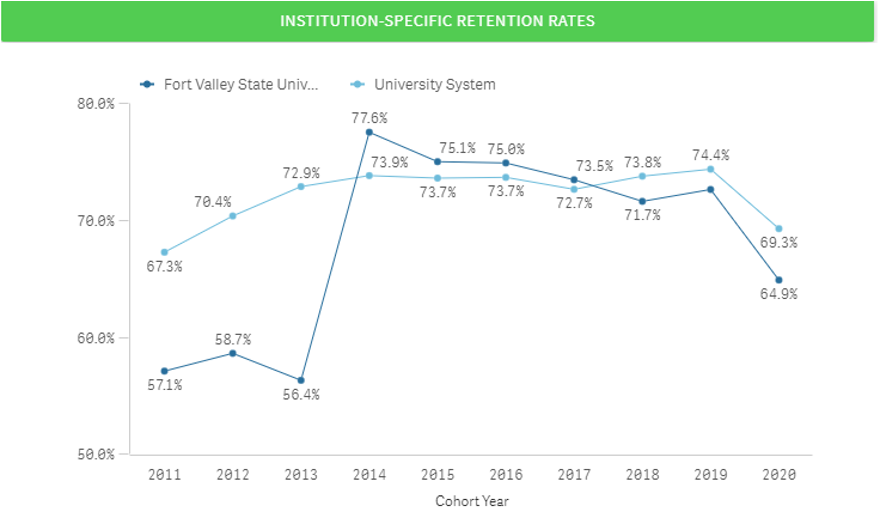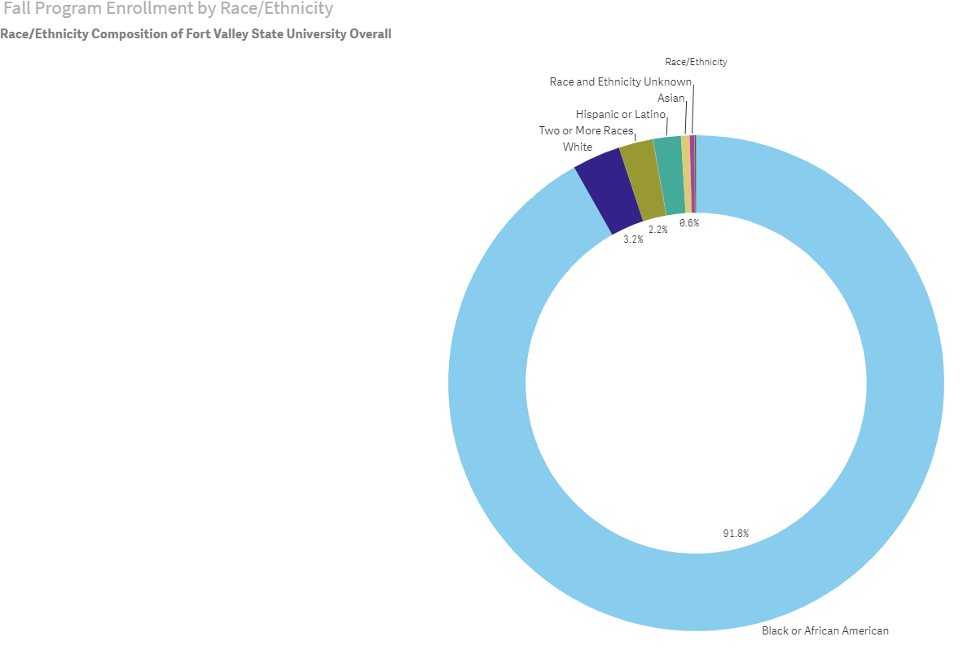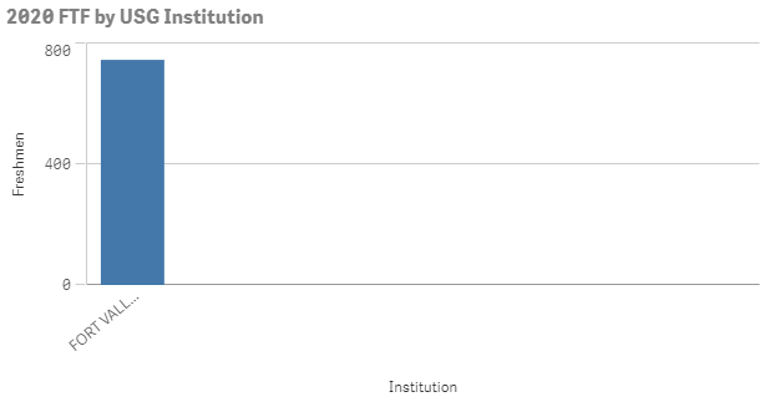Fort Valley State University Campus Plan Update 2021
SECTION 1: INSTITUTIONAL MISSION AND STUDENT BODY PROFILE
The mission of Fort Valley State University (FVSU) is to advance the cause of education with emphasis upon fulfilling commitments that our community members have undertaken collectively. As an institution of the University System of Georgia, Fort Valley State University naturally embraces the principles articulated by the Core Mission Statement for State Universities as approved by the Board of Regents of the University System of Georgia. The university’s primary commitments include, among others, enhancement of teacher training programs grounded upon a liberal arts foundation, as reflective of over 120 years of experience and tradition. As Georgia’s only 1890 Land Grant institution, FVSU offers academic programs in a variety of disciplines which include agriculture, family and consumer sciences, technology, and a new program in supply chain management just to name a few. FVSU has a commitment to continue to further its traditions of excellence in programs in the liberal arts and humanities, social, natural and physical sciences.
FVSU enrolled 2,827 students in fall 2020. The student retention rate for fall 2020 is 64.9%. The majority of FVSU students are African American (91.8%. See Figure 1),
FIgure 1. Fall Enrollment by Race/Ethnicity at Fort Valley State University
As of 2020, 92% of FVSU students received Pell Grant Funds. FVSU has 740 or 26% of the student body that identifies as a first-time full-time freshman (Table 2).
Figure 2. 2020 First Time Freshmen at Fort Valley State University.
Approximately 1% of the incoming freshmen class were considered adult learners (25 years or older), therefore the majority of the student body is comprised of high school graduates who are products of lower-performing high schools in the inner cities or rural areas. 1,797 or 63.5% of our population is female. These indicators were used as the committee devised the Complete College Georgia Plan for FVSU as benchmarks and as points of reference for strategies that should be developed to increase student success outcomes for the institution.
Figure 3. Comparison of Retention Rates Between FVSU and the USG.

The decision to focus our work on career assessment and career development stemmed from the desire to continue to increase retention, persistence, and graduation rates. There was a decline in retention this past year (from 72.7% with the 2019 cohort to 64.9%, with the 2020 cohort, Table 3). Graduation rates have increased approximately 8% over the last two years, however more connection to successful graduation and job placement is needed. Capitalization on corporate and community partnerships that can transition to job placement is tantamount to increasing student success.
SECTION 2: IMPROVEMENT PRACTICES
Better Use of Dynamic Forms
Previously, strides were made to improve at the institution to lessen the structural obstacles facing students. The migration to self-registration and the electronic process for academic advising assisted in streamlining the process for students and advisors. Initially, all forms were advisor initiated. Modifications were made to forms to make them student-initiated, creating a shared responsibility between the student and advisor. Updates were also made to the change of major form, and the mid-term drop form for better efficiency.
Earlier Advising and Registration Options for Incoming Freshmen
Most notably, the registration process for incoming freshmen improved tremendously. Incoming freshmen were engaged virtually for the first time in March of 2021. They were allowed to meet with their advisor and register for classes. Almost 400 incoming freshmen were registered prior to the end of May 2021. Almost 500 students were registered prior to the end of July 2021. In collaboration with Enrollment Management and Student Affairs, the same virtual opportunity will be presented to incoming freshmen for Spring 2021.
SECTION 3: BIG IDEA UPDATE
FVSU’s Big Idea integrated career assessment and career development. Specifically, advancing soft skills as it related to job and careers, in tandem with utilizing career assessments for incoming freshmen to make the connection to Momentum Year. Multiple workshops were created for students related to professional dress, career inventories, and internships. Additionally, Career Week was held virtually allowing students to attend multiple sessions for career exposure and experience. Career assessments were introduced in the FVSU 0100 course with connections to the Office of Career and Professional Development. Overall, more than twenty workshops were provided during the academic year. While these activities were seen as effective, their overall effectiveness cannot be fully measured as this was the first year of implementation and enough data has not been collected to fully assess and support their effectiveness. Some of the measurements that will be considered for assessments are:
- Percentage of completions relating to career assessments
- Percentage of attendees at career events
- Measurement of which career events were most attended to assess popularity of fields and organizations
In the future, career assessments will be provided before and/or during New Student Orientation. This will provide additional information for academic advisors as they discuss course options for students. Returning to the face-to-face environment will increase involvement in activities. Using Presence, data will be collected to determine which sessions are most beneficial. Additionally, demographic information provided (classification, major, etc.) will also be used to determine specific areas to address for future workshops.
SECTION 4: MOMENTUM PLAN MID-YEAR UPDATE
Section 4.1 Resilience update
The following areas were determined to be the top areas of focus and key activities that were to be undertaken for 2021:
- Academic advising leading to self-registration
- Data Day
- Leap Initiative
Academic advising leading to self-registration
Completion date: Sept. 1, 2021
|
Strategy or activity |
Successfully connecting the academic advising process and self-registration using various modalities for student ease and access. |
|
Summary of Activities |
University College Dean, academic advisors, career services staff and academic departments, and faculty advisors for the junior and senior levels advise students at a minimum of twice a semester. Training video will be utilized and will be mandatory to view prior to first advising appointment with incoming freshmen. Students will complete advising worksheet and meet with advisor in-person, virtually, and/or via phone. Advising hours will be moderately adjusted to accommodate student needs. |
|
Outcomes/Measures of progress |
Work in this area is already underway with students. A plan for its continuation in professional development with NACADA related to academic advising has been planned and is in progress for all faculty and professional advisors. |
|
Lessons Learned and Plans for the Future |
While the program is newly implemented, there is minimal data to assess and support the impact. However, we were able to determine that almost 400 incoming freshmen were registered prior to the end of May 2021. Additionally, almost 500 students were registered prior to the end of July 2021. Redefining academic advising is especially important so that the delineation between registration and academic advising can be properly understood and executed. The transition from high school counselors making schedules to students having the freedom to make their own has been especially challenging, as students struggle with following advisor suggestions vs. parental advice. Students will sometimes change courses (times they planned on taking courses) based on parental advice in spite of what they have been told by their advisor, which sometimes leads to hindrances in progression. A full understanding of the registration and advising process will be added to the parent orientation, so that they may also understand the importance of degree map progression. The University College Dean has been working with the other academic deans in relation to course scheduling to ensure proper course sequencing can be followed. The collaborative effort with Enrollment Management is also underway to assist with enrollment predictions by major which will assist with course scheduling for each semester. Furthermore, the University College Dean has requested that course scheduling is built at least an academic year in advance, rather than a semester in advance, so that students are able to properly plan and make modification according to grade reporting. |
DATA DAY
COMPLETION DATE: October 1, 2022
|
Strategy or activity |
Developing baseline data from each cohort which will include various demographic and other information. |
|
Summary of Activities |
University College Dean and Institutional Research Staff will monitor and assess various metrics to develop baseline data so that various trends can be identified, and modifications can be made in course scheduling, advising practices, and other areas that have been determined to be measured. Enrollment data will be shared throughout the campus community, as well as other data points. |
|
Outcomes/Measures of progress |
Work in this area is underway. The appropriate data points are being determined by stakeholders involved. Due to admission requirements adjusting because of the pandemic, it has been determined that a true baseline will not be able to be ascertained, as an accurate representation of the cohort will not be depicted until fall 2022. |
|
Lessons Learned and Plans for the Future |
|
LEAP Initiative
COMPLETION DATE: DEC. 1, 2021 (CHANGE TO FEBRUARY 1, 2022)
|
Strategy or activity |
Incorporate professionalism in the classroom, including email etiquette, service learning, and leadership skills and training. |
|
Summary of Activities |
The Center for Student Engagement staff and FYE instructors will work collaboratively to develop workshops and trainings for students. During NSO Week, faculty presented a workshop on proper email etiquette, to instruct students on proper email composition. “Wildcat Wednesdays,” a student-led initiative, has also been incorporated as a day of professional dress throughout campus. This day has been a collaborative effort spearheaded by Student Affairs (student leadership). Classroom presentation days have also been designated as professional dress days. |
|
Outcomes/Measures of progress |
Work in this area is underway with segmented populations. A living learning community has been piloted and is receiving targeted leadership instruction and workshops. More work needs to be done in this area to incorporate more of the campus population. Leadership skills classes are included as part of the College of Business curriculum as well. Service-learning projects are open to the entire campus community. Mandatory training is provided for students. Once training is completed, student names are entered into the registry of trained students to be matched with partner sites. |
|
Lessons Learned and Plans for the Future |
We are still collecting data to analyze for future planning. |
SECTION 4.2 GLOBAL MOMENTUM SUPPORT
e-newsletter
COMPLETION DATE: sept. 1, 2021 (CHANGE TO FEBRUARY 1, 2022)
|
Strategy or activity |
Developing a newsletter for disseminating information to parents, faculty, and staff. |
|
Summary of Activities |
The University College Dean, Director of Marketing and Communication and academic departments will determine how Momentum Year information should be shared in an e-newsletter. An invitation will be sent to contributors to discuss impact of Momentum Year activities and other information relevant to Momentum approach and progress. The e-newsletter will be distributed to FVSU family, via website, and/or email. |
|
Outcomes/Measures of progress |
Work in this area is being piloted through the Department of Education. The Dean of the College is distributing information related to Momentum Year and various topics to the department via email. Guest contributors have shared information related to academic advising, important dates, policy changes, and various celebratory announcements. Newsletter information is used as a reinforcement of information shared in department meetings. |
|
Lessons Learned and Plans for the Future |
|
podcast/video series
COMPLETION DATE: may 14, 2022
|
Strategy or activity |
Develop a podcast/video series for disseminating student information. |
|
Summary of Activities |
Identify relevant topics for students to disseminate information to students in a “student friendly” format. The University College Dean, Director of Marketing and Communication and academic departments will invite contributors for “success stories.” Information will be distributed through email, website, and social media. |
|
Outcomes/Measures of progress |
Work in this area is underway. First rollout of success stories began during Homecoming on social media with alumni, entitled, “Why I Love FVSU.” A sampling of students was surveyed in an informal setting to determine topics that they would like to see covered in videos and/or podcasts, with plans to begin recording in the spring to begin rolling out over the summer with the incoming freshman class. Some of the recommended videos include:
These items subjects will also be covered in the FVSU 0100, with the utilization of videos being used as teaching aids/reinforcement. |
|
Lessons Learned and Plans for the Future |
|
SECTION 5: OTHER EXISTING/ONGOING WORK
Fort Valley State University continues to advance the agenda of our ability to “Empower the Possible” within our students. This involves producing well-rounded scholars and citizens who will be productive contributors in society. Our global work depends on collaborative efforts and approaches that address changing conditions both academically and societally. Most recently, Fort Valley has increased its investment in high impact practices, concentrating on social justice and community-based learning. During New Student Orientation, various students were invited to the Tubman Museum for an excursion and introduction to social justice. The fall began with a webinar entitled, “Meeting This Moment: Answering the Call for Equity in the 21st Century.” We are extremely proud of the work that we are beginning to undertake in the social justice arena, and work is underway to connect these HIPs and others to our criminal justice department.
STUDENT SUCCESS AND COMPLETION TEAM
|
Name |
Title |
|
|
Dr. T. Ramon Stuart* |
Provost, Vice President for Academic Affairs |
|
|
Dr. Gregory Ford*1 |
Dean, College of Arts & Science |
|
|
Dr. Kimberly Andrews^ |
Dean, University College |
|
|
Dr. Ralph Noble |
Dean, College of Agriculture, Family Science & technology |
|
|
Dr. Rebecca McMullen*2 |
Dean, College of Education & Professional Studies |
|
|
Jessie Kane*3 |
Vice President for Student Affairs and Enrollment Management |
|
|
Kimberly Morris+ |
Director, Financial Aid |
|
|
Mrs. Sharee’ Lawrence |
Registrar |
|
|
Dr. Jocelyn Powell |
Director, Academic Support Services |
|
|
Dr. Ala’Torya Cranford |
Asst. Director, First & Second Year Programs |
|
|
Mrs. LuWanna Williams |
Director, Center for Student Engagement |
NOTE: Please note the following changes that have been made to the Student Success and Completion Team since the creation of the Momentum Plan (new members in bold):
|
Name |
Title |
|
|
Dr. Olufunke Fontenot |
Provost, Vice President for Academic Affairs |
|
|
Dr. Berlethia Pitts |
Interim Dean, College of Arts & Science |
|
|
*Dr. Kimberly Andrews |
Dean, University College |
|
|
Dr. Ralph Noble |
Dean, College of Agriculture, Family Science & technology |
|
|
Dr. Beth Day-Hairston |
Dean, College of Education & Professional Studies |
|
|
Dr. Timothy Hatchett |
Vice President for Student Affairs and Enrollment Management |
|
|
Director, Financial Aid |
||
|
Mrs. Sharee’ Lawrence |
Registrar |
|
|
Dr. Jocelyn Powell |
Director, Academic Support Services |
|
|
Dr. Ala’Torya Cranford |
Asst. Director, First & Second Year Programs |
|
|
Mrs. LuWanna Williams |
Director, Center for Student Engagement |
*Dr. Kimberly Andrews will no longer be with FVSU at the time of the next update.



